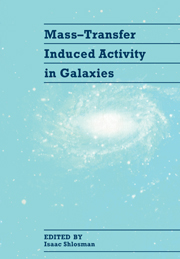Book contents
- Frontmatter
- Contents
- Preface
- List of Participants
- I INTRODUCTION
- II THE INNER PARSEC
- III THE CIRCUMNUCLEAR REGION
- IV GAS DYNAMICS AND STAR FORMATION IN BARRED AND NORMAL GALAXIES
- Star Formation in Barred Galaxies (Invited paper)
- Gas Dynamics and Star Formation in and Around Bars (Invited paper)
- Nuclear Starbursts in Barred Spiral Galaxies
- Molecular Inflows towards Galactic Nuclei
- Bar-Driven and Interaction-Driven Starbursts in SO/Sa Galaxies
- Gas Inflow due to Perpendicular Orbits in Barred Potentials
- Neutral Gas in the Barred Starburst Galaxy Maffei 2 (Poster paper)
- The Abundance Gradients in Barred Galaxies: the Role of Radial Flows (Poster paper)
- Bar Induced Non–Circular Molecular Gas Motions in M82 (Poster paper)
- Star Complexes and Evolution of Disk Galaxies (Poster paper)
- Interstellar Gas Flows in the Gravitational Potential Well of Density Waves (Poster paper)
- Massive Gas Rings in the Nuclei of Barred Spiral Galaxies (Poster paper)
- Pattern Speeds and Time Evolution in Ringed Galaxies from Observational and Simulational Databases (Poster paper)
- Large Scale Gravitational Instability and Galactic Viscosity (Poster paper)
- V NUCLEAR GAS AND LARGE-SCALE PROPERTIES OF AGN AND STARBURST HOSTS
- VI HOST GALAXY-AGN-NUCLEAR STARBURST CONNECTION
- VII GALAXY INTERACTIONS AND INDUCED ACTIVITY
- VIII GAS DYNAMICS IN ELLIPTICALS
- IX AGN AND STARBURST HOSTS AT LARGE REDSHIFTS
- X CONFERENCE SUMMARY
- Subject Index
- Object Index
- Author Index
Large Scale Gravitational Instability and Galactic Viscosity (Poster paper)
Published online by Cambridge University Press: 05 May 2010
- Frontmatter
- Contents
- Preface
- List of Participants
- I INTRODUCTION
- II THE INNER PARSEC
- III THE CIRCUMNUCLEAR REGION
- IV GAS DYNAMICS AND STAR FORMATION IN BARRED AND NORMAL GALAXIES
- Star Formation in Barred Galaxies (Invited paper)
- Gas Dynamics and Star Formation in and Around Bars (Invited paper)
- Nuclear Starbursts in Barred Spiral Galaxies
- Molecular Inflows towards Galactic Nuclei
- Bar-Driven and Interaction-Driven Starbursts in SO/Sa Galaxies
- Gas Inflow due to Perpendicular Orbits in Barred Potentials
- Neutral Gas in the Barred Starburst Galaxy Maffei 2 (Poster paper)
- The Abundance Gradients in Barred Galaxies: the Role of Radial Flows (Poster paper)
- Bar Induced Non–Circular Molecular Gas Motions in M82 (Poster paper)
- Star Complexes and Evolution of Disk Galaxies (Poster paper)
- Interstellar Gas Flows in the Gravitational Potential Well of Density Waves (Poster paper)
- Massive Gas Rings in the Nuclei of Barred Spiral Galaxies (Poster paper)
- Pattern Speeds and Time Evolution in Ringed Galaxies from Observational and Simulational Databases (Poster paper)
- Large Scale Gravitational Instability and Galactic Viscosity (Poster paper)
- V NUCLEAR GAS AND LARGE-SCALE PROPERTIES OF AGN AND STARBURST HOSTS
- VI HOST GALAXY-AGN-NUCLEAR STARBURST CONNECTION
- VII GALAXY INTERACTIONS AND INDUCED ACTIVITY
- VIII GAS DYNAMICS IN ELLIPTICALS
- IX AGN AND STARBURST HOSTS AT LARGE REDSHIFTS
- X CONFERENCE SUMMARY
- Subject Index
- Object Index
- Author Index
Summary
ABSTRACT
The large-scale dynamics of the interstellar medium in spiral galaxies is significantly determined by molecular cloud physics. Inelastic cloud-cloud collisions, coupled with gravitational instabilities generated by the gas cooling, give rise to a net flux of angular momentum which is equivalent to a (gravitational) “viscosity”. By using N–body model calculations of a self-gravitating disk we study the efficiency of collisions coupled with gravitational waves, and its importance for large-scale mass accretion in disk galaxies.
THE IDEA
The mass of the interstellar medium of galaxies is essentially included in an ensemble of clouds, whose physics on a small-scale dominates the dynamical behaviour. In a non-axisymmetric potential, the gas clouds are submitted to gravitational torques, which transfer angular momentum outwards, inducing an accumulation of gas in the central regions. Combes and Gèrin (1985) developed a collision model for the interstellar medium, including a mass spectrum of molecular clouds. If on the other hand, differential rotation is sufficient, the gas is submitted to viscous torques, which also accumulates gas in the central regions (Lesch et al. 1990). It is the aim of our investigation to connect these different approaches, by identifying the angular momentum transport in a non-axisymmetric potential with a viscosity. A study of the exchange of angular momentum and energy between clouds will provide an understanding of the nature of the gas “viscosity”.
- Type
- Chapter
- Information
- Mass-Transfer Induced Activity in Galaxies , pp. 189 - 190Publisher: Cambridge University PressPrint publication year: 1994



